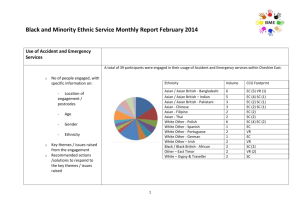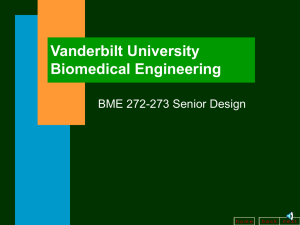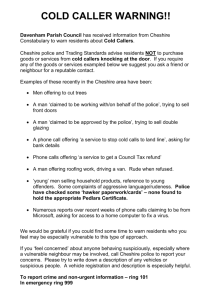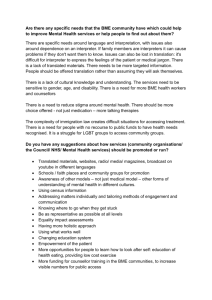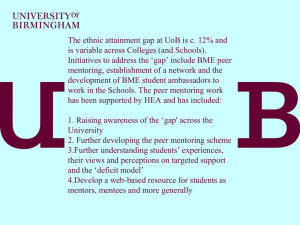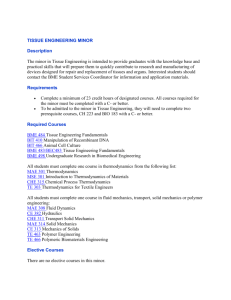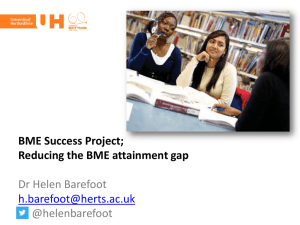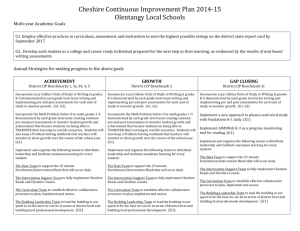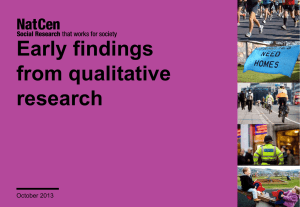BME Monthly Reporting July13 V.1
advertisement
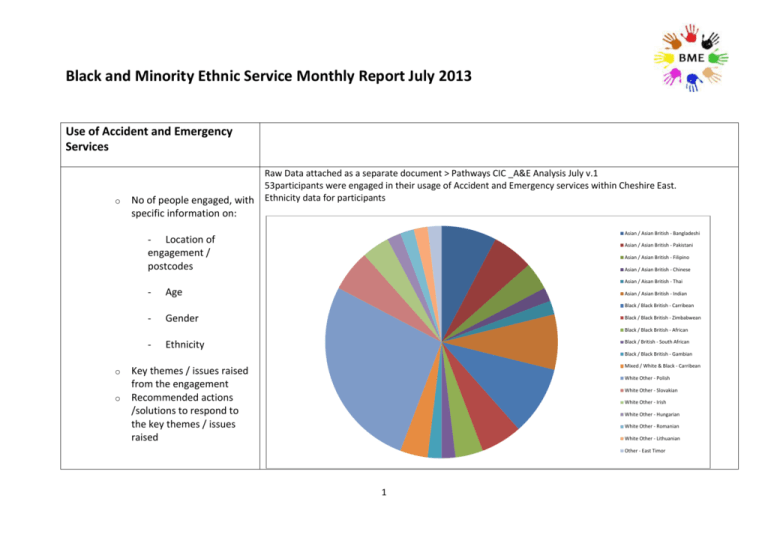
Black and Minority Ethnic Service Monthly Report July 2013 Use of Accident and Emergency Services o No of people engaged, with specific information on: Raw Data attached as a separate document > Pathways CIC _A&E Analysis July v.1 53participants were engaged in their usage of Accident and Emergency services within Cheshire East. Ethnicity data for participants Asian / Asian British - Bangladeshi - Location of engagement / postcodes Asian / Asian British - Pakistani Asian / Asian British - Filipino Asian / Asian British - Chinese Asian / Aisan British - Thai - Age Asian / Asian British - Indian Black / Black British - Carribean - Gender Black / Black British - Zimbabwean Black / Black British - African - Black / British - South African Ethnicity Black / Black British - Gambian o o Mixed / White & Black - Carribean Key themes / issues raised from the engagement Recommended actions /solutions to respond to the key themes / issues raised White Other - Polish White Other - Slovakian White Other - Irish White Other - Hungarian White Other - Romanian White Other - Lithuanian Other - East Timor 1 Postcode data for participants 20-35 36-50 51-65 66-85 86 and over total Full breakdown per CCG: South Cheshire 68% Vale Royal: 8% Eastern Cheshire: 24% Of the 53 participants, 2 chose not to share their postcode details and referred only to the area in which they lived. 2 Age of participants: Under 20 20-35 36-50 51-65 66-85 86 and over From the data collection there appears no common themes between age, ethnicity, gender in relation to either the reason for attendance (condition, illness, injury) or number of times attended. Attendance at A&E Child – 19 Infection – 1 Eye Injury - 3 Flu – 3 Fracture - 4 Shock - 1 Leg Injury - 1 Bells Palsy- 1 Nausea - 2 Neck Injury - 2 Heart - 3 Burns - 1 Stroke - 2 Unwell – 7 Seizure - 2 Head Injury – 2 High Temp – 1 Stomach Pain - 6 Back Pain - 3 Nose Bleed - 2 *data indicates conditions /injuries for attendance at A&E (identifies for some more than one attendance) 3 Child related attendances Cut finger – 1 Flu – 3 Fracture - 2 P. C - 3 Sickness - 6 High Temp - 3 Seizure - 1 (P.C – Complications during pregnancy) Almost all of the participants identified that where conditions related to their children, their immediate response is to take seek emergency treatment from A&E. Some provided feedback such as waiting times / availability of appointments at GP’s Surgeries and not being registered with a GP as the reasons behind their choice. When participants were encouraged to share positive experiences responses included suitable treatment of conditions, made patients feel comfortable, friendly staff, helpful, supportive, consultations were very clear, made patients feel better, When participants were asked about negative experiences responses included Waiting times, communication (no translator available), not registered with GP therefore treated poorly, discriminatory comments / actions from NHS staff regarding patients ethnicity, receptionists unsupportive, Communication and provisions of interpreting appear to be a significant factor in participants commenting on negative experiences. Due to communication / language issues, some of the participants felt that they were treated inappropriately and that others without communication barriers were treated much sooner. As a consequence, some felt this direct discrimination. Attendance figures at A&E during the past 12 months Once 33 2-5 times 15 4 5-9 times 3 10 and above 1 Not stated 1 Choose Well Campaign o No of people engaged, with The BME Service has this month facilitated 16 Sessions engaging a total of 43 individuals from multiple BME communities across Cheshire East, in addition to sharing information with those participants of the A&E specific information on: - Location of engagement / postcodes o o o - Age - Gender - Ethnicity Key themes / issues raised from the engagement Identified barriers faced to uptake of the Choose Well message Recommended actions /solutions to respond to the key themes / issues raised / barriers faced questionnaire. Sessions have taken place at Childrens Centres across Eastern Cheshire and Vale Royal, Multi faith groups, churches in Crewe, Macclesfield and Sandbach Regular monthly activity has resumed as we continue to deliver sessions weekly at Eaglebridge Health Centre (SC) and Watersgreen Health Centre (EC) that are now directed towards Choose Well and accessing the right services. We have recently made a further order of Choose Well materials in Bengali and Polish as all materials have been consumed at South Cheshire based centres. Social Inclusions Coordinators attend regular meetings with Shapla and Ocean in South Cheshire, the Gypsy and Traveller Community at sites in Winsford and Northwich, the Polish and Slovak church groups in Macclesfield, Northwich and Crewe. Choose Well information boards have been updated at regular drop in centres within South Cheshire to support BME communities in understanding / accessing the right services for conditions. We are in discussions with surgeries / local community groups across Cheshire East to deliver ChooseWell workshops and erect display boards with Choosewell information for patients / users. To date we have visual display boards with translated materials at Eaglebridge Health and Wellbeing Centre, Victoria Children’s Centre (Vale Royal), Drop in Centre (Watersgreen), Shapla, Polish Church (Northwich), Gypsy and Traveller site (Winsford). We are in the process of agreeing support for AGE UK in the engagement of BME communities within East Cheshire. We have identified local settlement trends within Macclesfield and Congleton of ethnicity groups and currently looking at methodologies, such as focus groups, breakfast mornings, workshops at AGE UK premises to engage elder generations of BME communities. The BME Service has met with Childrens centres within Eastern Cheshire to identify opportunities to deliver Choose Well workshops within Centres. A future invitiation for a meeting with Childrens Centre Area Manager is currently pending. 5 Further work is underway with Age UK in East Cheshire to support elderly people from BME communities to support information and guidance of services, self care and wellbeing. Feedback from drop in sessions per locality Eastern Cheshire Little if any information on how to access / register with GP’s GP’s referring patients through to A&E, however A&E staff not supportive / in agreement of referral Accessing A&E is only option as cant register with GP Poor relationships with GP’s and therefore opt to use A&E for medical advice No language appropriate support available on local CCG website – Information has been shared with those that were engaged Access to services becomes limited when required during working hours A&E offers a 24 hour service Appointments are not accessible with GP, have to wait for appointments GP referred patient Language barriers – Children are acting as interpreters Did not know that pharmacists could provide support other than to give medicine South Cheshire No knowledge of Choose Well and other services Understanding the role of pharmacists Cultural response / behaviours – have always used A&E Knowledge of services and how they can support patients. No understanding of Choose Well Suitability of communication / language appropriate materials Poor experiences with receptionists therefore reluctant to use GP Mistreatment by GP GP not supportive of conditions, advised patient to go home and rest, however patient required medical support which they got from A&E Discriminatory comments made by staff, reflected negatively on services Services in the day non accessible due to working commitments 6 No guidance for immigrants in how to access services other than guidance to register with GP Choice of services is informed by partner Little interest in maintenance of health, will access A&E when required Vale Royal – Understanding of local services and how / who they support. Communication within the community as to changes in national services had led to confusion Negative experiences of GP treatment has impacted on future use Poor communication Lack of interpreters Fear of using services following a negative experience with another patient whilst in the waiting room of surgery UK service are perceived as poor and therefore will travel to use private clinics in other areas (Manchester and Chester) Discriminatory comments by NHS staff Other objectives – Maternity / Smoking / Screening / Elderly People o No of people engaged, with specific information on: - Location of engagement / postcodes Tulip Sessions are continuing on a weekly basis at Eaglebridge Health Centre and have scheduled in regular sessions at Victoria Children’s Centre in Northwich. Tulip has enabled mothers with young children an opportunity to access health and wellbeing support for themselves and their children through support of a health advisor and linking in with Health Visitor teams. We have been working with Health visiting teams in Vale Royal in developing relationships and attaching Tulip to their attendance at the Victoria Children’s Centre. There have been 5 Tulip sessions facilitated during July with 9 attendees from BME communities, 15% of attendees were from white – European ethnicities, further engagement work is currently being undertaken with other BME communities to identify barriers and encourage attendance. We are using the data we collect from 7 o - Age - Gender - Ethnicity Key themes / issues raised from the engagement Recommended actions /solutions to respond to the key themes / issues raised usage of A&E to support parents with young children to consider alternative services / understand self care and treatment of conditions for infants through Choose Well. Health Visitors have been involved in a study with the BME Service in regards to the difficulties they encounter when supporting BME communities or those where English is not a first language. It became apparent during discussions that there are significant barriers where Health Professionals are unable to communicate fully with patients. Where father may act as an interpreter, certain issues are excluded from conversations and the impact is diluted as father acts as a partner and therefore has a personal response to what is being communicated. Where discussing PND, fathers have interjected and suggested that it will not be an issue, however mothers are unaware of support and coping mechanisms. Awareness of different cultures has also provided barriers. Some ethnic communities tend to adhere to cultural practices when having children, this was suggested as a barrier as Health Visitors are not educated or aware of such practices, creating a negative relationship between professional and patient and have led to conflicts in treatment. Such barriers identified that although with best intentions, Health Visitors may not be able to support to their full potential Discussions have been held with AGE UK and Health watch Cheshire East as to how we can support in engagement of BME communities. AGE UK are keen to further engage older people. As discussed previously we are in discussions about the suitability of sessions. We are engaging the local populations on their views and areas of support. Asset Mapping o Table of identified community assets with specific information on: - Data is continually being obtained and database updated regularly from engagement with BME communities. We currently have information of over 40 agencies either supported or facilitated by BME groups / community groups to support local populations within Cheshire East and Vale Royal Name 8 - Description - Location - Target audience - Contact details - Frequency of meetings (if applicable) - Services offered (if applicable Patient Experiences o No of patient stories produced on film with specific information on: o - Location - Age - Gender - Ethnicity Videos continue to be collected with clients / communities on what services are accessed and what were the participant responses. We are currently collecting patient experiences on why they access the services they do, what services are they accessing and their responses to service delivery with a specific focus on Accident and Emergency, knowledge of services, primary, secondary and acute and collaborating with Choose Well. 4 case studies have been attached to this report. Type of service commenting in (acute 9 o hospital, primary care, community provision, mental health etc) Positive or negative experiences 10
